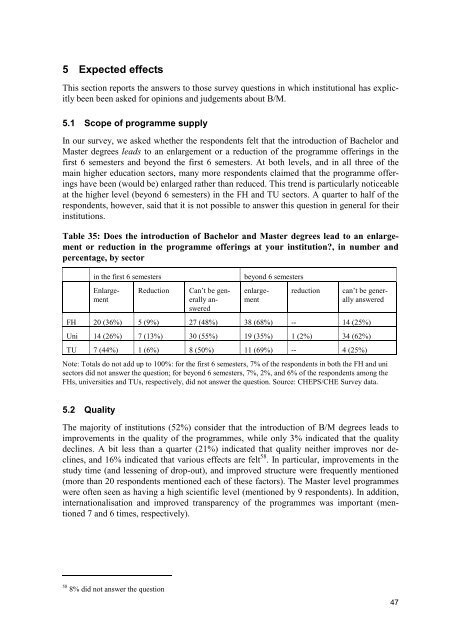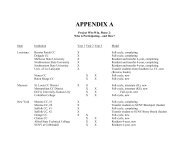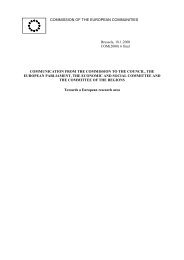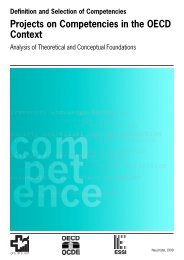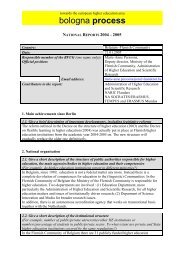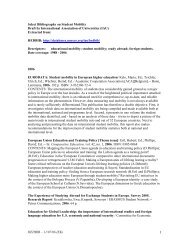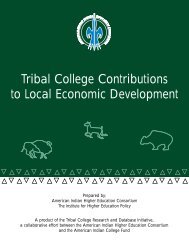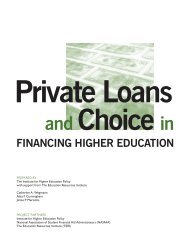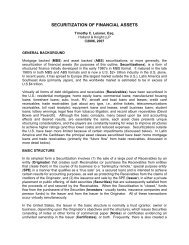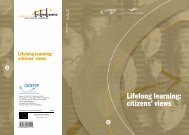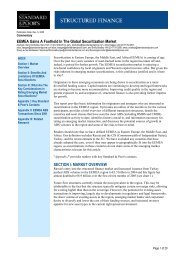and Master Programmes in German Higher Education Institutions
and Master Programmes in German Higher Education Institutions
and Master Programmes in German Higher Education Institutions
- No tags were found...
Create successful ePaper yourself
Turn your PDF publications into a flip-book with our unique Google optimized e-Paper software.
5 Expected effectsThis section reports the answers to those survey questions <strong>in</strong> which <strong>in</strong>stitutional has explicitlybeen been asked for op<strong>in</strong>ions <strong>and</strong> judgements about B/M.5.1 Scope of programme supplyIn our survey, we asked whether the respondents felt that the <strong>in</strong>troduction of Bachelor <strong>and</strong><strong>Master</strong> degrees leads to an enlargement or a reduction of the programme offer<strong>in</strong>gs <strong>in</strong> thefirst 6 semesters <strong>and</strong> beyond the first 6 semesters. At both levels, <strong>and</strong> <strong>in</strong> all three of thema<strong>in</strong> higher education sectors, many more respondents claimed that the programme offer<strong>in</strong>gshave been (would be) enlarged rather than reduced. This trend is particularly noticeableat the higher level (beyond 6 semesters) <strong>in</strong> the FH <strong>and</strong> TU sectors. A quarter to half of therespondents, however, said that it is not possible to answer this question <strong>in</strong> general for their<strong>in</strong>stitutions.Table 35: Does the <strong>in</strong>troduction of Bachelor <strong>and</strong> <strong>Master</strong> degrees lead to an enlargementor reduction <strong>in</strong> the programme offer<strong>in</strong>gs at your <strong>in</strong>stitution?, <strong>in</strong> number <strong>and</strong>percentage, by sector<strong>in</strong> the first 6 semestersEnlargementReductionbeyond 6 semestersCan’t be generallyansweredenlargementreductioncan’t be generallyansweredFH 20 (36%) 5 (9%) 27 (48%) 38 (68%) -- 14 (25%)Uni 14 (26%) 7 (13%) 30 (55%) 19 (35%) 1 (2%) 34 (62%)TU 7 (44%) 1 (6%) 8 (50%) 11 (69%) -- 4 (25%)Note: Totals do not add up to 100%: for the first 6 semesters, 7% of the respondents <strong>in</strong> both the FH <strong>and</strong> unisectors did not answer the question; for beyond 6 semesters, 7%, 2%, <strong>and</strong> 6% of the respondents among theFHs, universities <strong>and</strong> TUs, respectively, did not answer the question. Source: CHEPS/CHE Survey data.5.2 QualityThe majority of <strong>in</strong>stitutions (52%) consider that the <strong>in</strong>troduction of B/M degrees leads toimprovements <strong>in</strong> the quality of the programmes, while only 3% <strong>in</strong>dicated that the qualitydecl<strong>in</strong>es. A bit less than a quarter (21%) <strong>in</strong>dicated that quality neither improves nor decl<strong>in</strong>es,<strong>and</strong> 16% <strong>in</strong>dicated that various effects are felt 58 . In particular, improvements <strong>in</strong> thestudy time (<strong>and</strong> lessen<strong>in</strong>g of drop-out), <strong>and</strong> improved structure were frequently mentioned(more than 20 respondents mentioned each of these factors). The <strong>Master</strong> level programmeswere often seen as hav<strong>in</strong>g a high scientific level (mentioned by 9 respondents). In addition,<strong>in</strong>ternationalisation <strong>and</strong> improved transparency of the programmes was important (mentioned7 <strong>and</strong> 6 times, respectively).58 8% did not answer the question47


